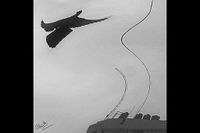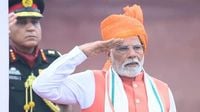On August 15, 2025, Prime Minister Narendra Modi delivered a sweeping 103-minute address from the ramparts of the Red Fort, marking his 12th and longest Independence Day speech to date. The speech, which touched on everything from public health to economic reform and national security, reflected both the urgent challenges and ambitious aspirations facing India as it looks toward its 100th year of independence in 2047.
One of the most pressing issues Modi highlighted was the alarming rise of obesity across the country. According to a recent Lancet study cited by India Today, India now ranks third globally for the number of overweight and obese individuals, trailing only the United States and China. The study predicts that by 2050, more than one-third of India’s population could be classified as obese if current trends continue. Modi, echoing experts’ warnings, cautioned that “one in every three people in India will suffer from obesity in the coming years.”
In a bid to counter this growing health crisis, the Prime Minister offered a practical suggestion to households across India: reduce cooking oil purchases and usage by 10%. “When I talk about fitness, I have a concern that I need to highlight. Obesity is becoming a huge public health problem for India. It is projected that at least one in three people will become obese. We have to get freedom from obesity. That’s why I suggested that every family decide to buy 10% less oil, use 10% less oil, and participate in the fight against obesity,” Modi declared, as reported by India Today.
The rationale is straightforward. As Modi explained, oil is highly calorie-dense—just one tablespoon contains about 120 calories. Cutting back on oil by even a small percentage can translate to meaningful reductions in daily calorie intake. For instance, if a family typically uses three tablespoons of oil per day, reducing that amount by 10% would save roughly 36 calories daily. While this may seem minor, Modi stressed that such small, sustained changes can add up over months and years, potentially leading to significant improvements in public health. He encouraged families to adopt this measure as a collective resolution, emphasizing that “we must protect ourselves from obesity.”
Modi’s focus on health extended beyond obesity. He also highlighted the achievements of the Ayushman Bharat Pradhan Mantri Jan Arogya Yojana, which has provided more than Rs 5,00,000 for senior citizens’ health needs. “When we help senior citizens with more than Rs 5,00,000 for their health needs, it shows our concern for their well-being,” he said, according to The Indian Express. The Prime Minister underscored the importance of freeing citizens from the habit of silently enduring illness and pointed to India’s growing prowess in pharmaceutical innovation. He called for the development of new medicines, vaccines, and life-saving treatments to be undertaken entirely within India, reinforcing his vision of a self-reliant nation.
Self-reliance—or “Atmanirbhar Bharat”—was in fact a central theme throughout Modi’s address. He argued that self-reliance is not merely about balancing imports and exports or currency values, but about enhancing India’s capability across sectors. “Self-reliance is linked to our capability, and when self-reliance begins to diminish, capability too continually declines. Therefore, to preserve, maintain, and enhance our capability, it is imperative to be self-reliant,” Modi asserted, as reported by The Indian Express.
He detailed the need for India to reduce dependence on foreign sources in critical areas, including defense, space, minerals, energy, semiconductors, fertilizers, pharmaceuticals, operating systems, cybersecurity, deep tech, and artificial intelligence. “The bedrock of a Viksit Bharat is also a self-reliant Bharat,” Modi said, urging influencers and traders to champion “vocal for local” initiatives and display Swadeshi products in their shops.
Addressing the nation’s youth, Modi called on them to bring forward innovative ideas. “Today’s ideas could shape the future of generations to come. I stand with you. I am ready to work for you. I am ready to be your partner in this journey…To the youth who are thinking about manufacturing, come and take the lead. Tell me, if we need to change government rules. The country does not want to stop now,” he encouraged, according to The Indian Express.
To facilitate this wave of innovation, Modi announced the creation of a task force charged with undertaking next-generation reforms. This group, he said, would work within a set timeframe to redraft rules, laws, and policies to better suit the 21st century and align with the vision of making India a developed nation by 2047. The reforms, he promised, would reduce compliance costs for start-ups, small industries, and cottage industries, and provide a major boost to exporters through improved logistics and systems.
Economic relief was another headline from Modi’s address, with the Prime Minister promising a “Diwali bonanza” in the form of GST reforms and rate cuts. He said, “This Diwali, I am going to make it a double Diwali for you. The people of the country are going to get a very big gift. In the last 8 years, we have done a big reform of GST, reduced the tax burden across the country and simplified the tax regime. Now, after eight years, time has come to review it… We are going to come with the next generation of GST reforms, this will be a gift for you this Diwali. The taxes on essentials required by the common man will be reduced substantially… a lot of facilities will be increased. Our MSMEs, our small entrepreneurs will get a huge benefit. Everyday items will become very cheap and that will also give a new boost to the economy.”
On the international front, Modi addressed concerns over stalled trade talks with the United States, particularly regarding pressure to open India’s markets to American farm produce. He made it clear that the interests of Indian farmers, livestock rearers, and fishermen would not be compromised. “India’s farmers, cattle rearers, fishermen are our biggest priorities. Modi is standing like a wall against any harmful policy related to the farmers, fishermen and the cattle rearers of India. India will never accept any compromise regarding its farmers, its livestock farmers, its fishermen,” he declared.
National security and demographic change were also on Modi’s agenda. He warned of the “grave concern and challenge” posed by infiltration and illegal immigration, especially in border states like Assam and West Bengal. Announcing a new High-Powered Demography Mission, he said, “As part of a deliberate and well-thought-out conspiracy, the demography of the country is being altered. Seeds of a new crisis are being sown. These infiltrators are snatching away the livelihoods of our youth. These infiltrators are targeting our sisters and daughters. This will not be tolerated.” He emphasized that demographic changes threaten national security, unity, and progress, and vowed that the new mission would address the issue in a deliberate and time-bound manner.
Modi’s speech also included a strong endorsement of the Rashtriya Swayamsevak Sangh (RSS) as it approaches its centenary, calling it “the world’s largest NGO, with a century-long history of devotion.” He praised its “service, dedication, organisation, and unmatched discipline,” and saluted the swayamsevaks for their century-long journey of national service. The remarks, however, drew criticism from opposition parties, particularly the Congress, which called the praise “most-troubling.”
He didn’t shy away from political controversy, attacking the Congress party over its record on the Constitution and the Emergency, and highlighting his government’s commitment to social justice and the development of backward classes. Modi also celebrated India’s linguistic diversity, arguing that the development of all languages would strengthen the country’s knowledge systems and global standing.
As India stands at a crossroads, Modi’s Independence Day speech outlined a vision that is at once ambitious and pragmatic, calling for collective responsibility and bold reforms while addressing the immediate challenges of public health, economic growth, and national security. The nation, it seems, is being asked to take many small steps—like using less oil in the kitchen—while keeping its eyes firmly fixed on the horizon of a developed, self-reliant Bharat.


